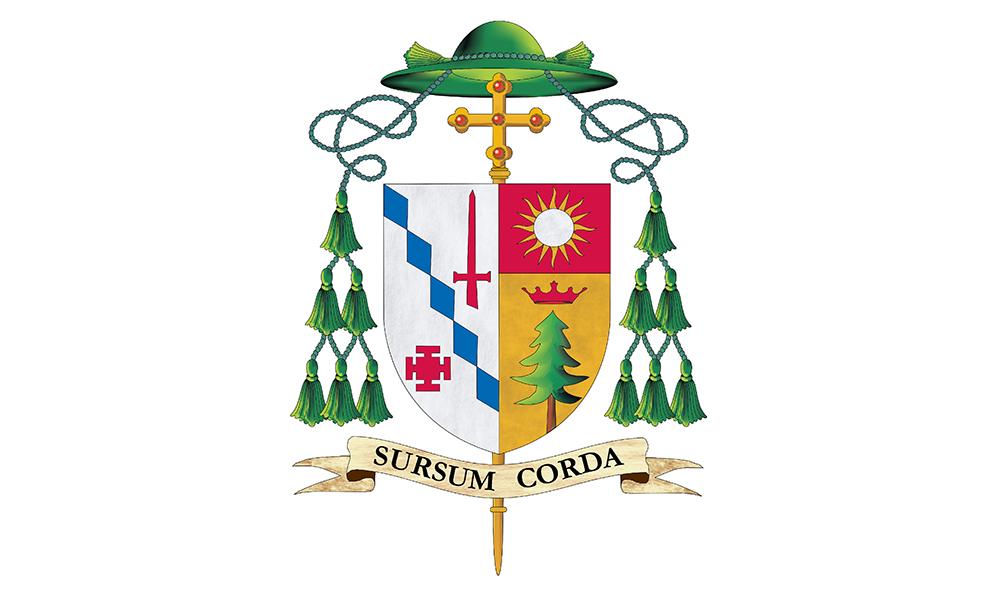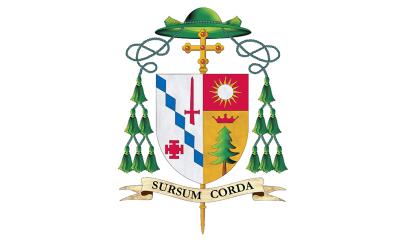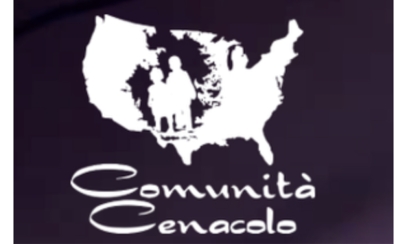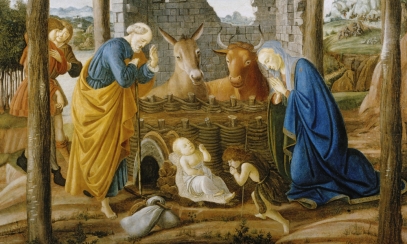
‘Come Lord, Be With Us and Stay With Us!’
Bishop Raica Celebrates the Fourth Sunday of Advent
Bishop Raica Celebrates the Fourth Sunday of Advent
On Dec. 18, Bishop Raica celebrated the Fourth Sunday of Advent at Our Lady of Sorrows Catholic Church in Homewood. The complete text of his homily follows herein.
On Dec. 18, Bishop Raica celebrated the Fourth Sunday of Advent at Our Lady of Sorrows Catholic Church in Homewood. The complete text of his homily follows herein.
My brothers and sisters in Christ, getting around to different parishes is such a joy for me. Today, a week before Christmas this year, I have the blessed occasion to be here with you at Our Lady of Sorrows. On this fourth Sunday of Advent, we are on the cusp and full of joy that the birth of Christ will be celebrated soon. We don’t get a lot of time to prepare! Even though we are still in Advent, the clues of Christmas are beginning to appear. Permit me to anticipate a little bit as the fullness of time approaches. Perhaps, one of the more familiar carols we sing simply begins, “O Little Town of Bethlehem … how still we see Thee lie.”
Bethlehem, whose name means “house of bread,” is a small town. It was not that prominent. Certainly, it was not like the county seat, or center of commerce. It was a sleepy little village that did not draw much interest in the world except for now. Nowadays, for those in the Christian faith, it is the place to go and visit to see the place of our Lord’s birth. A church is built there to commemorate the event and various fields around the village are identified as shepherd’s fields.
The church there, the Church of the Nativity, commemorates the site where Jesus was born. This time of year, there is an influx of pilgrims. The church itself looks a lot like any other church, so it is unremarkable in one sense. It does have, however, an unusual feature that is not well known for those who have never been there – its main front door. It is not normal size. Rather, it is quite small, meaning very low – so low, that one must crouch down to enter into the church. In fact, small children can walk right through. Adults have to bend down!
The fact that one must stoop down to enter the church building is symbolic and instructive for us if we are to understand the real meaning of Christmas – now just a week away. Our proud ideas must be set aside, along with our conviction that only the prosaic and the factual can convey real meaning. The glory of this season is realized by hearts willing to bow down, to crouch, to humble themselves and let Mystery and Wonder overcome. Wonder gives way to belief and faith!
Nothing about Bethlehem, as it is narrated in the Gospels of Luke and Matthew, seems to fit our idea of a truly significant and impressive place where such an event of great importance would occur. We think, “That’s not how all of this should work!” The locale is wrong, for instance. To the minds of the intellectuals and scholars, the birth of the Messiah, if it is to have relevance, should have occurred either in Jerusalem, the religious capital, or in Rome, the political capital. The observers of the birth were in no way distinguished or important. The movers and shakers of the day were not there. No journalists or cameras were there to capture the event for us. The birth was to be observed only by some shepherds guarding their flocks and, shortly thereafter, by some wayfaring astrologers. The powerful of the world, the leaders in politics or religion, the chroniclers of important happenings never even noticed what took place in Bethlehem. It’s as though Christ snuck into our world. And the central figures, Mary and Joseph, were common folks. Joseph, a carpenter by trade; Mary, a very young peasant girl. Such was Bethlehem and the people who went there.
With the celebration of Christ’s birth just around the corner, there is still something particular about this season that still captures our imagination. There is a sense of something very special being heralded. We are caught up in emotion as we hear a carol sung or played, see a touching Christmas special on TV or a Christmas play at our parish, notice a nativity set, struck by a star in the sky or a barn star on a silo as we drive down a country road, or see magic and wonder in the eyes of a child as the season unfolds. Somehow, often to our own surprise, wonder lives again with us.
Christmas makes clear the way in which God deals with us. God works through very unpromising means to achieve great things. He takes the small, insignificant things, as we think of them, and utilizes them to accomplish His will. This is a process that began in Bethlehem’s manger and continues today.
So it is that God forever surprises us. The mighty and the powerful seem to be the very thing God avoids. Not in an earthquake, wind, or fire does He speak, but in a “still, small whisper.” He does not come as a kind of brash commander-in-chief preceded by military parades to demonstrate power and might, but rather in the dependency of a Child – needy, helpless, and homeless.
St. Paul caught this aspect of God’s method when he wrote, “God chose what is low and despised in the world, even things that are not, to bring to nothing things that are, so that no human beings might boast in the presence of God.” (I Cor. 1:28-29) And what began in the little town of Bethlehem has continued as God’s way of working.
For sure, this is a tremendously significant insight. Christmas is a reminder that in God’s world, the power of weakness finally prevails over and against the weakness of power. For Christian faith, what the world perceives as power is really flawed. This makes no sense apart from faith in the God who revealed His nature in the Child, wrapped in swaddling clothes and lying in a manger. At the heart of the world, eyes of faith see not brute force of the powers that be, but infinite love. There is a power in weakness that finally prevails against the most sophisticated notions and ideas that can be devised. Love rather is something that “never fails” and is an insight born in Bethlehem’s manger – where those who truly hunger, will satisfy their souls.
There are some encouraging implications for us today. We sometimes think that the Church is made up of “important” or perfect people. The reality is that it is made up of ordinary people, saints, and sinners. The Apostles were flawed and so are we. We see this at the very beginning with Mary and Joseph. We also see it in the group of disciples Jesus gathered to carry on His mission. None of them was from a privileged class. All had to come with an open heart and open mind.
Considerations such as these make this a great time in which to celebrate this annual event. Christmas is a perpetual reminder that we dare not yield to despair. Just when we think there’s not a chance for anything new, Isaiah proposes a new hope: “A shoot shall sprout from the stump of Jesse.” Subsequently, there is a birth in a crude manger. The world takes on new hope. Just when we think that the final reality is power and importance, a small group of ordinary people is called as a band of disciples. Just when we are about to abandon our dreams and hopes of how we think things should be and turn out, we begin to realize that God’s dream for us far exceeds anything we could ever imagine. God’s dream is based on His providential designs to which we must continually yield.
So, as we look for signs and wonders to fulfill our life, there is one important one we should not overlook: “The virgin shall conceive, and bear a son, and shall name Him Emmanuel.” (Is 7:14) A name which means “God-is-with-us.” Our first reading and Gospel highlight this sign as a vivid reminder that love, the love of God, comes through people who must incarnate it.
Like entering the Church of the Nativity in Bethlehem, it is before this Presence in her that we will bow as we acknowledge a fact in the form of an event that has changed the course of history and offers hope for the world and us, even today. Yes, Bethlehem may be like some small village not far from Birmingham, but great things still happen. The final verse is a prayerful entreaty: “O holy Child of Bethlehem, descend to us, we pray; Cast out our sin and enter in, be born in us today. We hear the Christmas angels the great glad tidings tell: O come with us, abide with us, Our Lord, Emmanuel.”
On this Fourth Sunday of Advent, so close to Christmas, we implore the Lord once again: “Come Lord, be with us and stay with us! Let us be overwhelmed by you!”



